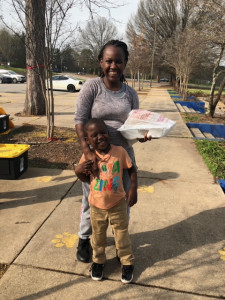When Atlanta Public Schools closed its schools due to COVID-19 beginning March 16, the families in south Atlanta–one of the most concentrated areas of chronic poverty in Georgia–faced food insecurity, disruption of income, and medical uncertainty.
At Thomasville Heights Elementary School (THES), many students don’t have access to three healthy meals a day without the school’s cafeteria.
 Purpose Built Schools Atlanta and the THES community identified gaps in food access for students and their families amidst the COVID-19 school closures and sprung into action. Although APS had set up distribution sites to provide breakfast and lunch to students, their closest site was – initially – too far for THES students to access safely.
Purpose Built Schools Atlanta and the THES community identified gaps in food access for students and their families amidst the COVID-19 school closures and sprung into action. Although APS had set up distribution sites to provide breakfast and lunch to students, their closest site was – initially – too far for THES students to access safely.
Led by Tania Herbert, Urban Agriculture Coordinator at The Paideia School, and Javan Wyche, Director of After-School Programming at THES, the Thomasville Heights (T.H.E.) Take-Home Project mobilized volunteers and parents from the community to collect and then distribute APS breakfasts and lunches to THES students each morning in their own neighborhood.
Meanwhile, APS made THES an official food distribution site, making it even easier for the community to have access to these meals. When this happened, Javan and her team of volunteers pivoted to offer support for this expanded effort.
To further address families’ needs, the T.H.E. Take-Home Project started organizing to serve healthy evening meals, for students and their families, three days a week. The goal is to stimulate and support an effective local response to the THES community’s food needs, while observing the CDC-recommended social distancing tactics.
These meals are prepared by local chefs using produce grown by local farmers, including THES’ own student-farmers on their school farm. Led by THES school farmer, Eva Dickerson, with support from the Paideia School Urban Agriculture program, THES and Paideia School students are contributing vegetables grown on their own farms to many of these evening meals. This allows children to help feed their families and to participate in their local food system in a meaningful way. Equally important is the community building aspect where individuals, families and organizations are working together in this stressful time.
THE Take-Home Project works with local food entrepreneurs who are cooking their favorite dishes to provide healthy family meals during the school shutdown. In this way, the collaboration addresses food insecurity, while supporting the local food economy by providing both business and jobs.
Clearly, this grassroots effort is a great example of how local problems can be addressed by mobilizing local resources.
